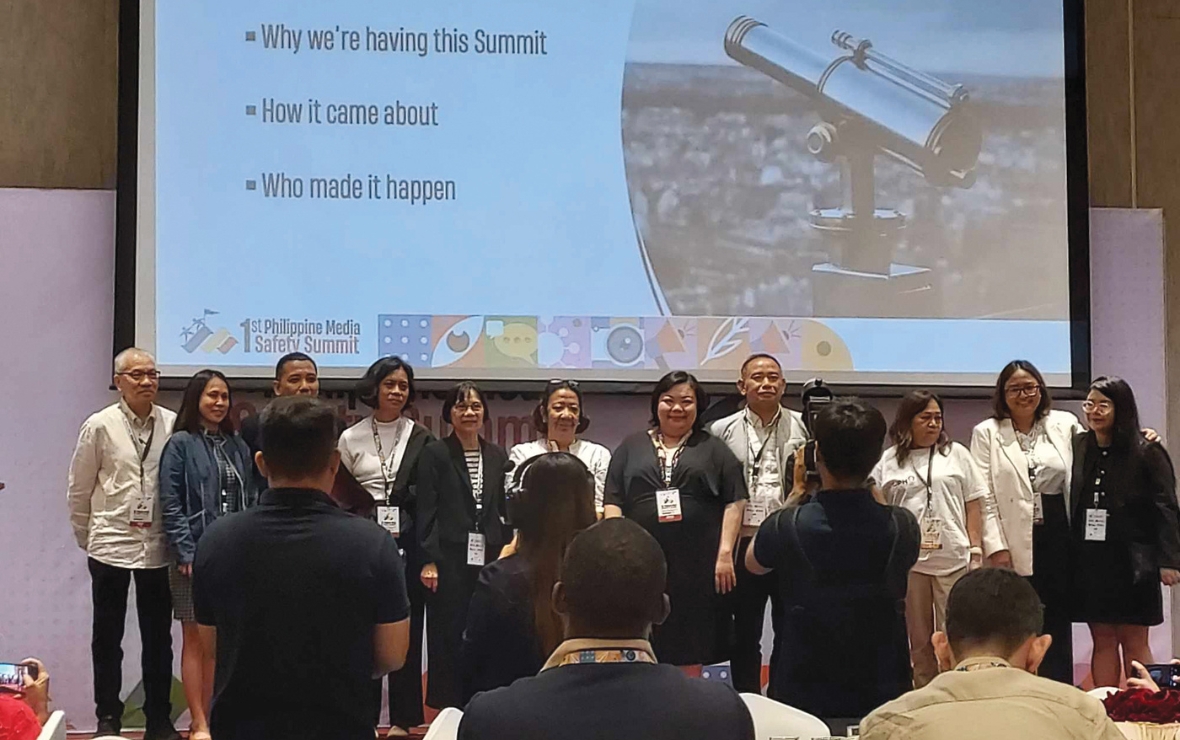ni RIZA ZUÑIGA
Bilang paggunita sa World Press Freedom Day, ilang kasamahang mamamahayag sa radyo, telebisyon, pahayagan at online news ang nagsama-sama para maihatid ang kaunaunahang deklarasyon sa panawagan ng kaligtasan ng mga mamamahayag sa Pilipinas noong ika-3 ng Mayo 2024.
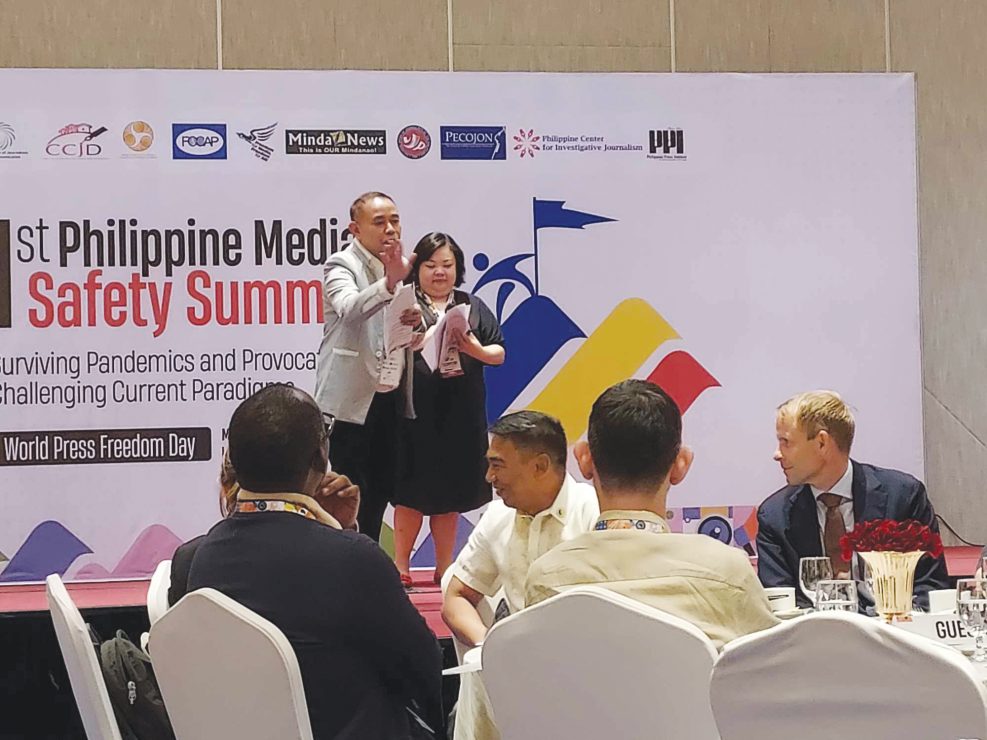
May 170 mamamahayag ang nagsidalo at nakiisa sa panawagan para sa kaligtasan ng mamamahayag na Pilipino mula sa iba’t ibang panig ng bansa at mundo. Sina Ariel Cervantes Sebellino ng Philippine Press Institute (PPI) at Joyce Pañares, Managing Editor ng Manila Standard, ang mga punong-abala sa daloy ng mga talakayan sa loob ng dalawang araw.
Sa pagsisimula, ang nagbigay ng pangkalahatang-ideya tungkol sa Summit ay si Jes Aznar, miyembro ng Foreign Correspondents Association of the Philippines (FOCAP).
Ang panauhing pandangal mula sa Commission on Human Rights (CHR) ay ang Chair na si Atty. Richard Palpal-latoc na nagbahagi na ang kanyang ahensya ay nanatiling kabahagi ng media sa pagbabahagi sa publiko tungkol sa usaping karapatang-pantao.
Saad ni Chair Palpal-latoc: “Your safety is not just a matter of law, but a reflection of our collective commitment to upholding human rights and defending the truth. For in the pursuit of truth, no one should ever walk alone.”
Sinundan ito ng mga nagbigay ng suporta sa mamamahayag na Pilipino, sina: Christian Halaas Lyster, Norwegian Ambasador; Maki-Katsuno-Hayashikawa, Director and Representative ng UNESCO Multi-Sectoral Regional Office sa Jakarta; Lars Bestle, Regional Director , International Media Support (IMS) at Peter Mackenzie, Country Director, Internews Philippines.
Si Mackenzie ay nagpahayag na, “Kami ay sumusuporta sa mamamahayag na Pilipino simula pa noong 2010 at 2019.”
Ang kanilang organisasyong Internews ay may ka-partner na 20 civil society at media partners sa bansa, na nakatuon sa pagpapabuti ng kaligtasan ng mamamahayag na Pilipino at pagkakaroon ng kalayaan sa pamamahayag, nagpapatibay ng kapasidad ng media at ibang organisasyon para matukoy ang problema sa disimpormasyon at masamang impluwensya, at ang pagpapalakas ng regulasyon sa sarili ng mga nasa sektor ng media.
Ang tatlong mahahalagang paksa na ibinahagi ng mga kilalang mamamahayag ay tungkol sa Human Rights as the Overarching Framework of Journalist Safety, ibinahagi ni Dr. Nymia Simbula, Chair ng Philippine Alliance of Human Rights Advocates (PAHRA); Facts and Figures: The State of Media Safety in the Philippines, ang nagbigay ng sitwasyon ay si Melinda Quintos de Jesus, Executive Director ng Center for Media Freedom and Responsibility at tungkol sa The Philippine Plan of Action on the Safety of Journalists: Gains in Addressing Safety, Security and Sustainability, ang nagpaliwanag ay si Red Batario, Executive Director ng Center for Community Journalism and Development.
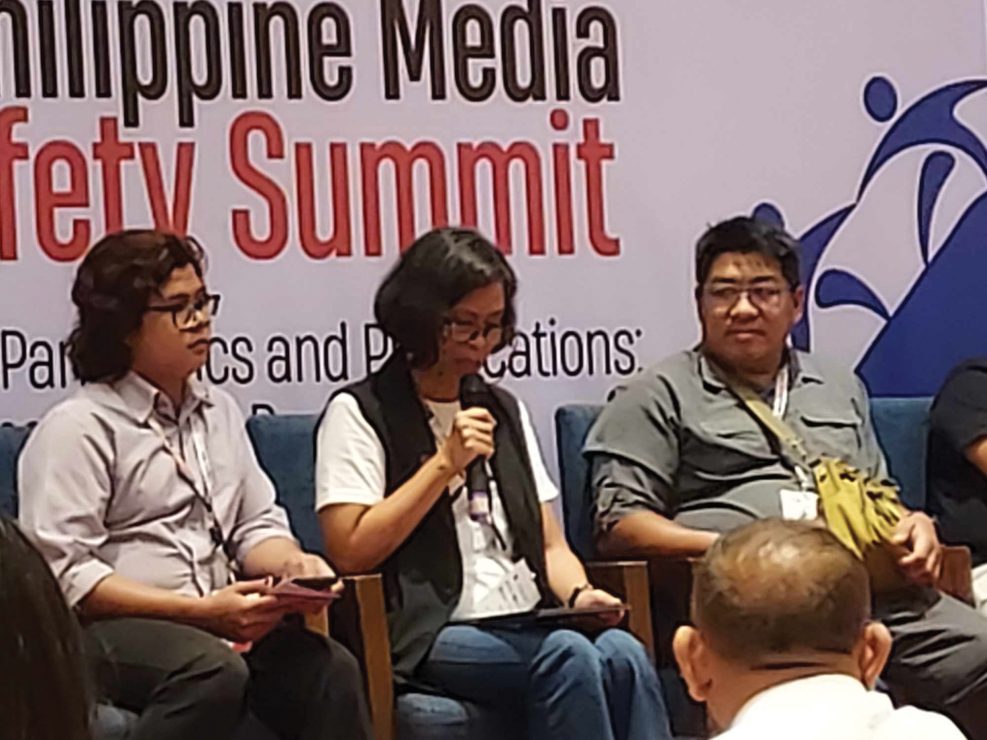
Bago nagtapos ang sesyon sa unang araw, ibinahagi at ipinaliwanag nina Therese San Diego Torres at Anne Lourdes Lopez ng Asian Institute of Journalism and Communication, ang Synthesis at Orientation ng Panel Discussion at Breakout Session.
Sa ikalawang araw, nagkaroon ng panel discussion sa mga kwento mula sa iba’t ibang komunidad sa bansa. Ibinahagi ang mga sumusunod: Ensuring Conducive Working Conditions and Duty of Care, Searching a Sustainable Business Model: The Print and Broadcast Business Amidst a Rapidly Changing Media Landscape, Facing the Challenges of Freelance Journalism, Addressing Gender-Based Threats and Attacks, Tackling Issues confronting Visual Journalists, at Enhancing the Role of Journalism Education in Media Safety.
Pagkatapos ng pagsasalaysay ng mga karanasan sa breakout session ng mga grupo sa Safety, Security at Sustainability, ang naging bunga para sa ikalawang araw ay ang pagkakaroon ng 1st Philippine Media Summit Declaration.
Philippine Media Safety
Summit Declaration:
A Call for the Protection and Safety of Journalists in the Philippines
Timog Avenue, Quezon City, Philippines
May 3, 2024
On the 1st Philippine Media Safety Summit commemorating World Press Freedom Day on May 3, 2024, journalists, media workers, educators, human rights, and press freedom advocates from Mindanao, Visayas, Luzon, and Metro Manila affirm that:
- A democratic society is best served by independent and critical media that can help citizens make sense of events happening around them and become critical thinkers. Better journalism, alongside more responsive and democratic political and social institutions, builds a better society.
- Journalists perform their jobs effectively under conditions of freedom or the observance of free expression, trust in journalism, economic sustainability, diversity, gender equality, and inclusivity.
- Freedom of the press and freedom of expression in the Philippines are fundamental rights and constitutionally guaranteed.
We likewise condemn
- The continuing killings of journalists and the lack of resolution of cases; and 2. The deliberate targeting of journalists and media organizations.
We also reaffirm
The Philippine Plan of Action on the Safety of Journalists (PPASJ) that promotes the safety and protection of journalists, and provides a multi-stakeholder framework and platform to coordinate efforts to:
- Strengthen journalists’ professional competencies to increase the public’s trust in media;
- Improve working conditions in media;
- Strengthen legal and social structures and mechanisms to deal with various forms of harassment, threats, and attacks on journalists;
- Counter impunity by helping multi-stakeholder efforts to strengthen the courts and the methods of criminal investigation and prosecution; and
- Increase public awareness and knowledge about the role of media in society through public information, citizen-media engagement, and research.
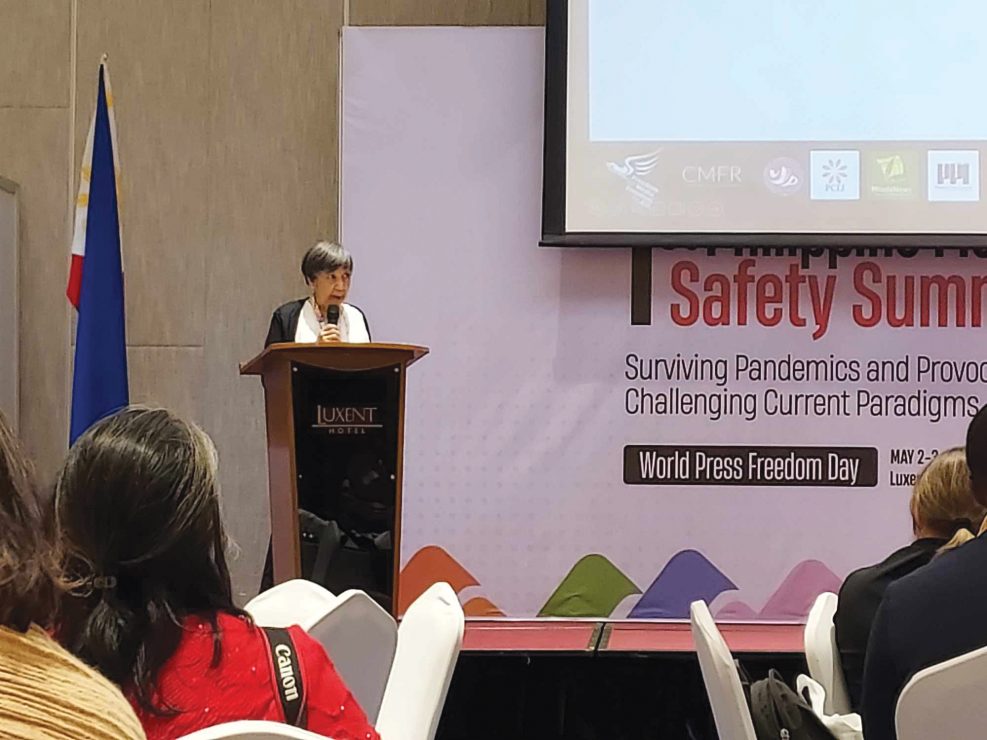
The PPASJ has provided guidelines in support of the above five flagship goals. However, there is a need for these goals to be fleshed out by journalists and media organizations, academic institutions, human rights advocates, and other sectors to highlight the following:
- That the government should perform its Constitutional mandate and duty to stop the killings and all forms of violence against citizens including mainstream and campus journalists and media workers, and to properly investigate crimes committed against them, including “red-tagging,” trolling, and other forms of online hate and violence. The government should work for the immediate release of journalists wrongfully charged and imprisoned without cause.
- That media owners should recognize the rights of journalists and staff to form associations and unions; provide fair and decent living wages, and an inclusive and gender-fair environment and safe workplaces, allowing journalists and staff to work without external pressure. While these workplaces are adapted to the latest technology, such as AI, their business models should not allow the deskilling, marginalization, and displacement of journalists.
- That media organizations should support journalists to perform their roles effectively, and provide legal and psycho-social support especially if they are terminated, threatened, or killed.
- That newsrooms and media organizations should provide the necessary skills, materials, training, and other resources to journalists, especially those going to hostile coverages, to ensure their safety and protection in the line of duty.
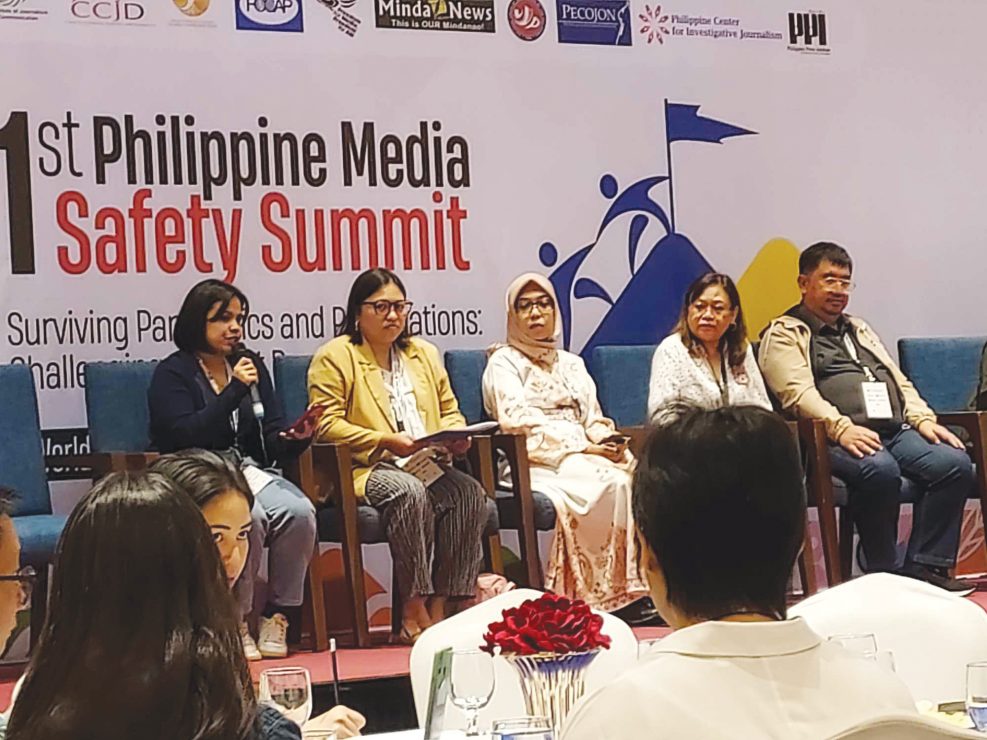
- That journalists and media organizations should perform their work to the highest standards of their craft and provide to the best of their ability balanced and accurate reportage of events. They should hold themselves accountable to whatever they release to the public and encourage feedback and corrections of their lapses.
- That media organizations and journalist associations should extend support to colleagues by coming up with mechanisms to publish or broadcast stories and images which are otherwise suppressed for reasons of safety, self-censorship, and lack of support, by releasing them in their news organizations and other independent platforms, and in collaboration with other journalists and media outlets in the spirit of solidarity.
- That small and micro media organizations should be given support to sustain their operations and ensure their longevity by linking them with funding institutions and non profit groups that invest on communication and media projects based in communities. Support should also include intergenerational exchanges of views and sharing of skills to ensure the survival of hyperlocal media organizations that answer the informational needs of the community.
- That media organizations should explore diverse business models, various revenue streams, narrative techniques for local stories, distribution and marketing channels, and financial strategies including training services, monetizing the content, images, and archives, without sacrificing ethics, truthfulness, and other journalistic values.
- That media organizations and journalists should engage with policy makers and legislators in relation to laws concerning security and welfare issues of journalists and media workers, including the repeal of the Anti-Terror Law and Cyber Laws which became the basis for cyberlibel, “red-tagging” of journalists, surveillance and profiling of journalists, and capturing their digital footprints to be turned against them.
- That the role of multi-platform audio content coming from legacy radio, fringe internet radio and podcast producers should be revisited as a strategy of connecting with communities through streaming.
- That there should be dialogue between media groups and funders on how to rationalize fund use through capacity building so that journalists can focus on writing their stories and not be tied down by drawn-out financial procedures.
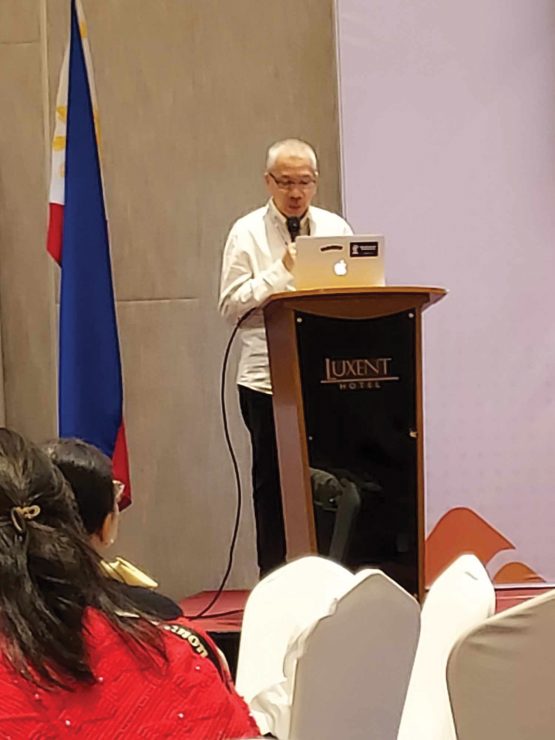
In conclusion,
The delegates of the 1st Philippine Media Safety Summit further affirm and agree to follow up and implement the actions herein stated including the post-summit roadshow events to popularize the Philippine Plan of Action on the Safety of Journalists, in partnership with other organizations or individually.

